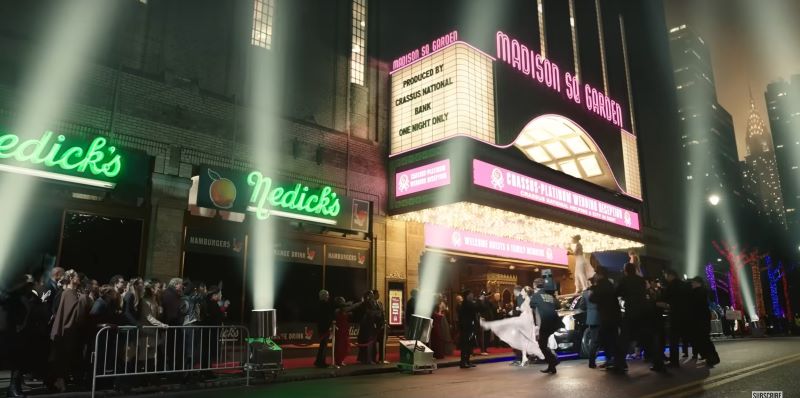Filmmaker extraordinaire Frances Ford Coppola is struggling with placating puzzled film critics, marketing an esoteric film to wide audiences and struggling for industry sales for his “Megalopolis.” The $120 million self-financed social commentary epic is in competition at the Cannes Film Festival in France, where Coppola hopes those problems will be solved by critical acclaim and splashy news coverage.
Coppola got good news May 16 when Imax formally agreed to book “Megalopolis” on its big cinema screens (commercial release is expected at end of the year), no doubt believing the five-time Oscar winner and “The Godfather” movies maestro is an audience magnet for the cultured cinema crowd. The feisty filmmaker is 85 years old.
But getting further distribution is necessary. A closed industry screening March 28 for Hollywood buyers did not land a big studio distribution deal.
“Megalopolis” made its world premiere at Cannes a few days ago on May 16 (the fest runs May 14-25) and professional film critics had mixed reactions. The audience at the fest gave Coppola’s film a 10-minute standing ovation, though all in-competition films get that respectful treatment.
Vulture.com critic Bilge Ebir panned in an article headlined: “Megalopolis Is a Work of Absolute Madness.” The Variety review opined the film is “bold” but at the same time “ungainly.” Others were upbeat.

The buzz from Hollywood insiders from that closed screening in March is that the film is esoteric, so lacking broad appeal, and thus expected financial returns moderate. The financial hurdles include a big marketing campaign since “Megalopolis” won’t be an easy sell to moviegoers. Its prime audience is upmarket adults with sophisticated tastes, which excludes the larger youth market that drives popular culture and less sophisticated audiences who don’t like arty.
With the private March screening in Hollywood yielding no compelling distribution offers, Coppola instead is going the independent route to stitch together patchwork deals to cover the world. Some territories such as auteur-loving France are no problem, but other countries will be, especially for Coppola to get distribution deal prices to cover the $120 million budget. Plus, Coppola wants a pricey $80 million-100 million global marketing campaign, which buyer distributors will also shoulder.
In a nutshell, “Megalopolis” is saddled with major-studio caliber economics, but its limited audience appeal makes it more suitable for budget-conscious specialty distributors. The movie would make economic sense at 33% of the production budget and about the same fraction marketing expense, so Coppola’s return on his major-studio-sized investment is uncertain.
Going the indie route, Coppola did not embrace support of a cadre of advisors such as talent agency rep, possibly because he thought that “Megalopolis” would land a studio distribution that would have negated the need for indie-style sales.
A Variety story by Brent Lang, Tatiana Siegel and Matt Donnelly says that Coppola eventually hooked up with Paris-based film sales company Goodfellas, which has licensed “Megalopolis” to a handful of territories. Interestingly, there’s a carve-out allowing global streaming, so Coppola could license to a Netflix-type streamer; that alone could be expected to generate tens of millions of dollars, depending on rights conferred in a worldwide streaming window.
The closed industry screening in March was a risk because it did not impress Hollywood. “Some potential indie outfits have seen the film and don’t feel like there’s much upside,” the Variety story says. “They don’t believe the movie has much Oscars potential beyond technical categories and they fear that Coppola will be an overly demanding partner.”
The film, which Coppola worked on for decades as a passion project, delivers an indictment of today’s political gridlock and reckless spending bankrupting society. Coppola calls the drama a “Roman epic,” referring to the ancient Italian empire in decline amid decadence, though his movie takes place in an imaginary modern city.

Positioning the movie as pseudo art with the Cannes fest pedigree is perhaps the best hope for “Megalopolis” with moviegoers. That’s a draw for arty audience and some curious, though not a draw for larger audiences who want car chases and pies-in-the-face laughs.
“Megalopolis” makes a statement about political dysfunctionality in society, but without addressing today’s red-hot divide between conservatives/Red States and progressives/Blue States. Sidestepping that bitter divide is smart, as A24 Distribution’s “Civil War” drama did, becoming a sleeper hit earlier this year.
To some, Coppola’s current travails recall his big-budget cautionary-tale war film “Apocalypse Now,” about which he said at a 1979 Cannes fest press conference: “There were too many of us. We had access to too much money, too much equipment, and, little by little, we went insane.”
Time has been kind to “Apocalypse Now,” which now routinely makes short lists of the best pictures of all time.
Related content:

Leave a Reply